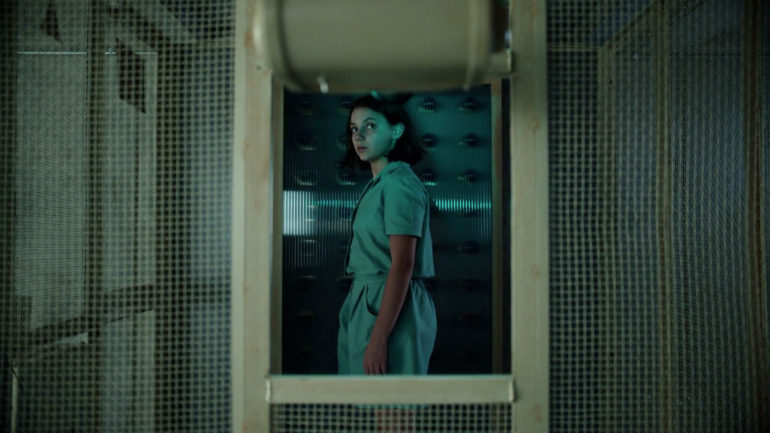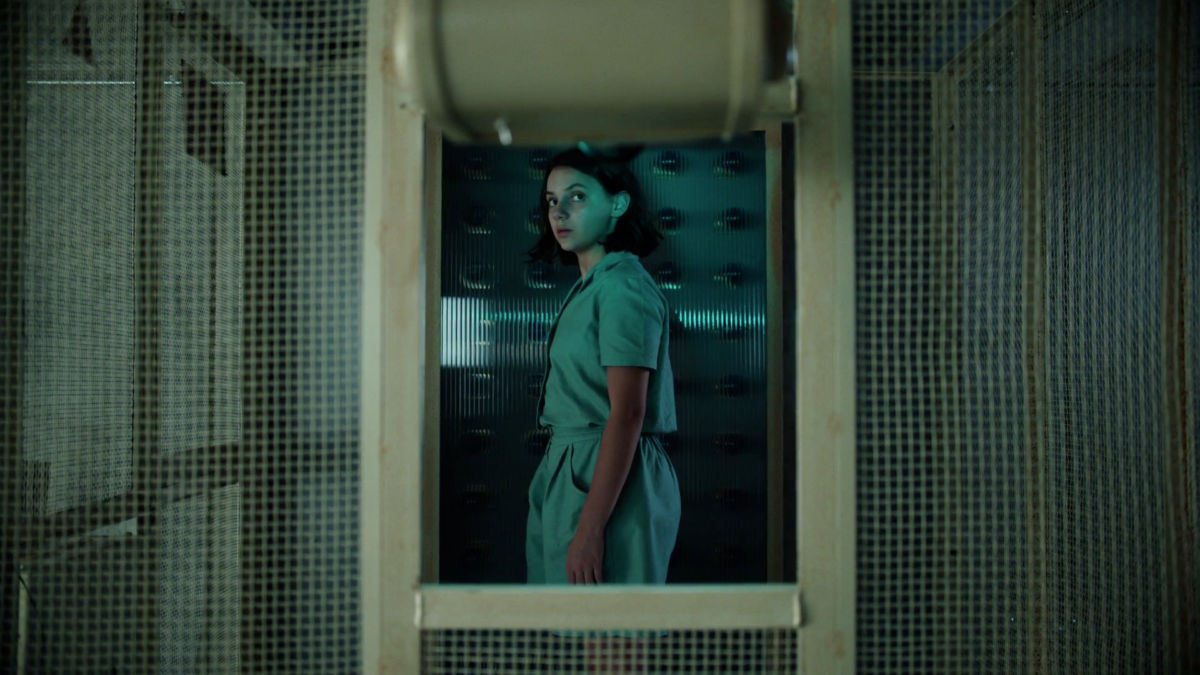The main thrust of our review of last week’s His Dark Materials was that the show had, regrettably, built its house on sand. By neglecting the relationship between people and dæmons, it ran into trouble trying to depict the horror of that relationship being tampered with. This in mind, the only option ‘The Dæmon-Cages’ really has is to take other routes in demonstrating how heavy the narrative’s gotten – and it actually delivers.
I’ve praised the set design before, from the Rowling-style Oxford to the ramshackle Trollesund, but Bolvangar trumps the lot simply by looking straight-out evil. One of J.K. Rowling’s strengths with Harry Potter was drawing on a dizzying range of beloved old ideas, and Bolvangar here is much the same, except coming from the opposite direction – all the visual cues here will ring an unpleasant bell for pretty much anyone.
Whereas last week’s episode found itself wandering a bit – quite literally at times – ‘The Dæmon-Cages’s goals are a lot clearer. Narratives are all about conflict, so they always pick up when the enemy cast off their veils and come into plain view, and this one is no exception.
‘Conflict’ in that formula doesn’t necessarily have to be the literal mano-e-mano kind, but here it is, and it feels not just welcome but a bit overdue. The biggest action scenes His Dark Materials has had so far were character-establishing moments for Lee Scoresby and Iorek Byrnisson respectively, and both had something of the chummy about them – not Looney Tunes-level unserious, but essentially fun things rather than cutthroat. ‘The Dæmon-Cages’ , you may not be surpised to hear, holds up the other side of this.
When the fighting starts properly, many of the participants are largely indistinguishable from each other, but this isn’t as big a disadvantage as it usually would be. You can pick out the named characters, but that’s not even the crux of it – the actual fighting isn’t the important bit here. It’s another element of visceral background chaos that the children have to scurry their way through. Because lest we forget, whatever else this show might be, it’s an adaptation of a children’s book.
In the interests of full disclosure, I’m in what must be the show’s target audience – i.e. millennials who read the books as kids. So it wouldn’t be unfair to assume an episode that’s got a spot of action to go around will naturally appeal to the boyish part of my soul that still fondly remembers the originals, and certainly, that doesn’t go amiss. But the strongest sequence of ‘The Dæmon-Cages’ is an old-fashioned talkie, with no shootings or decapitations to help it along, just two actors in a room together.
It’s not a dialogue in the old-fashioned sense, both are for the most part talking straight past each other, but that’s a feature, not a bug. Pinter’s The Caretaker is largely made up of conversations just like this, as are the General Ripper scenes from Kubrick’s Dr. Strangelove, which I’ve always suspected would work very well on stage as a two-hander.
Dafne Keen plays it as disaffected as you might expect, in a suitably pre-teenage way (an aspect of the character that’s actually name-checked here). But as well as she does that, and even if deliberately acting disaffected wasn’t a bit self-defeating, Ruth Wilson clearly takes the prize again.
There’s a great strain of small-c cynical thought about how the worst kinds of evil come from those who are committed to doing the right thing. C.S. Lewis, famous for writing a kind of Christian version of His Dark Materials, noted “The robber baron’s cruelty may sometimes sleep, his cupidity may at some point be satiated; but those who torment us for our own good will torment us without end, for they do so with the approval of their own conscience.” What Ruth Wilson captures here is that kind of figure coming unraveled as the contradictions of their own worldview hit them starkly in the face.
I say it’s not a dialogue based more on Wilson’s performance than Keen’s. A child who’s not invested in the conversation – even justifiably, as here – can still be part of a dialogue. But the way Wilson plays it, she’s not talking to Keen so much as she is to herself, trying vainly to justify it all to her own conscience. What makes it most impressive is that it could so easily have been a bog-standard villainous breakdown – and perhaps it still is, but even the harshest critic would have to admit it’s marvellously performed.
The above seems to be running the risk of sidelining Dafne Keen a bit, which would be particularly unfair. For a while now Lyra’s been spending most of her time in friendly territory, where she’s unfortunately just The Child. It’s in hostile environs that her character shines, which correspondingly gives Keen a lot more to work with. Again, this is an adaptation of a children’s work, so some of the best moments will inevitably be the child leads getting the better of hapless adults.
But let us circle round to the other end of the spectrum, as any decent review should. There’s two notably off moments in ‘The Dæmon-Cages’, and both – with grim aptness considering the content of the episode – involve cuts. In one case, it’s fairly clear a conversation was meant to go on for longer, to set the mood a little more, only to presumably find itself trimmed for time. The dead giveaway is when an empty table finds itself suddenly fully occupied between shots.
The second is simpler. It’s a helpless victim of the show’s pre-watershed status, where, after we’ve already seen a good number of violent deaths, a neck-breaking is shouldered roughly off-camera by a hasty cut, in that awkward way that fruitier content is sometimes edited out of shows when repeated for daytime audiences.
Those two, though, are the only bum notes present. After last week’s slightly aimless installment of His Dark Materials, ‘The Dæmon-Cages’ is a welcome uptick.
Some of the coverage you find on Cultured Vultures contains affiliate links, which provide us with small commissions based on purchases made from visiting our site. We cover gaming news, movie reviews, wrestling and much more.




